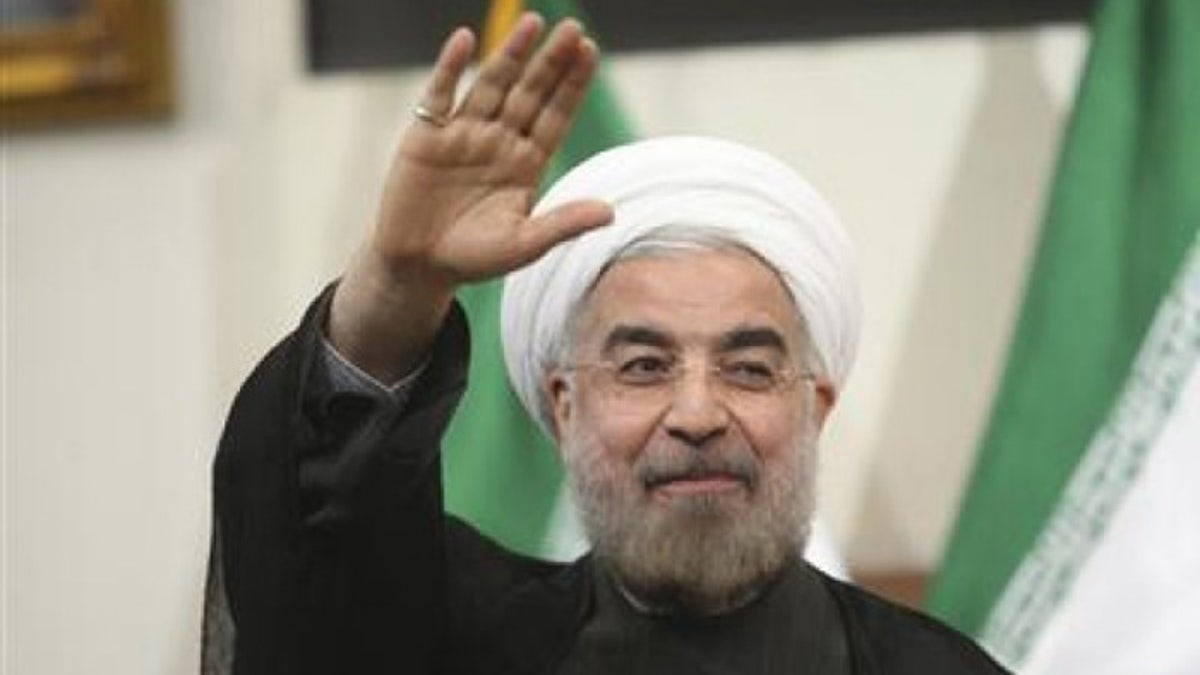
Rowhani condemned the use of chemical weapons in Syria, but does not believe it has been shown the attack was the work of Assad. (Reuters)
President Obama believes military strikes in response to Syria's alleged use of chemical weapons will send a wider message about America's resolve to curb aggressive regimes, but the mullahs in Iran don't appear to be listening.
Iran's new president, Hassan Rowhani, and the religious leaders that oversee him have vowed to continue their support for Syrian President Bashar Assad and their own bid to develop a nuclear program regardless of what the U.S. does about Syria. And if there should be a U.S.-led strike against Syria, Iran could be drawn into the fray, according to Rowhani, who said he would work with Russia in “extensive cooperation” to retaliate against any military action by the U.S. in Syria.
Russia and Iran have been backing the Assad regime throughout its 29 months of political turmoil against opposition forces. Rowhani said on national television that “military action will bring great costs for the region,” and “it is necessary to apply all efforts to prevent it.”
He also called such military action an “open violation” of international laws.
Historically, Syria and Iran became strong regional allies in the aftermath of Iran’s 1979 Islamic Revolution.
Since Syria’s ‘Arab Spring’ began in March 2011, the Iranian regime has provided billions of dollars in weapons, training and manpower to the Syrian regime to keep Assad in power.
Currently, Iran-backed Hezbollah fighters, members of the Iranian regime’s Revolutionary Guard and other volunteers are on the ground in Syria fighting rebel forces.
Many were hopeful that Rowhani, who ran his campaign as a so-called ‘moderate,’ promising to focus on his country’s dismal economy and other domestic issues, would take a milder approach in Syria.
[pullquote]
Following his predecessor and Iran’s Supreme Leader, Rowhani, who was elected in June and took office in August, publicly committed staunch support for Syria from his first day in office.
Rowhani publicly condemned the use of chemical weapons on his website and Twitter account, but Iran and Russia dispute the U.S. claim that it was Assad who unleashed sarin gas on Syrian civilians. They believe it was the work of rebel factions seeking to draw in the U.S.
The mullahs in Tehran have bitter memories of chemical warfare that killed many Iranians in the Iran/Iraq War that dragged on for eight deadly years beginning in 1980, when the Islamic Republic had just taken over the country after the Shah was deposed.
Ralph Peters, Fox News military analyst and retired Army lieutenant colonel, said any action the U.S. takes against Syria must factor in a possible Iranian response.
“[President Obama] is not thinking through the potential consequences," Peters said, adding that a U.S. strike could also put America on the same side as Al Qaeda sympathizers, who are also fighting Assad.
Obama is currently courting Congress to get backing for a possible strike, a move which polls say could be unpopular with the war-weary public. While America's appetite for military action appears to be lacking, Iranians also are questioning their government's involvement in Syria. Many in the economically depressed nation question how their government can be pouring money into Syria when so many Iranians are facing economic hardship at home.
Currently, Iran’s inflation rate is more than 35 percent, and unemployment has been in the double digits for years, as Western-backed sanctions meant to punish and deter Iran’s ongoing nuclear weapons program continue to deteriorate their economy.
